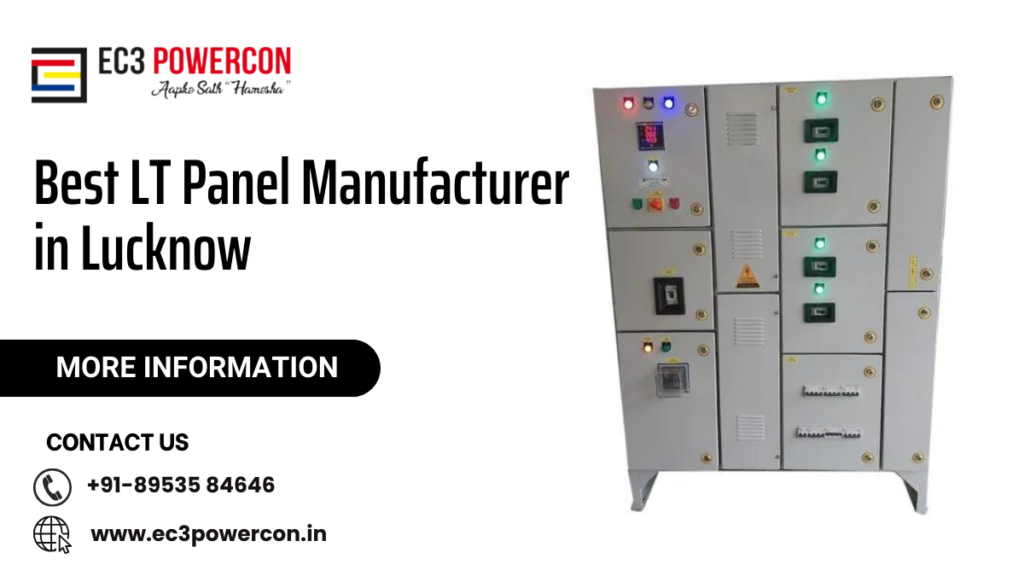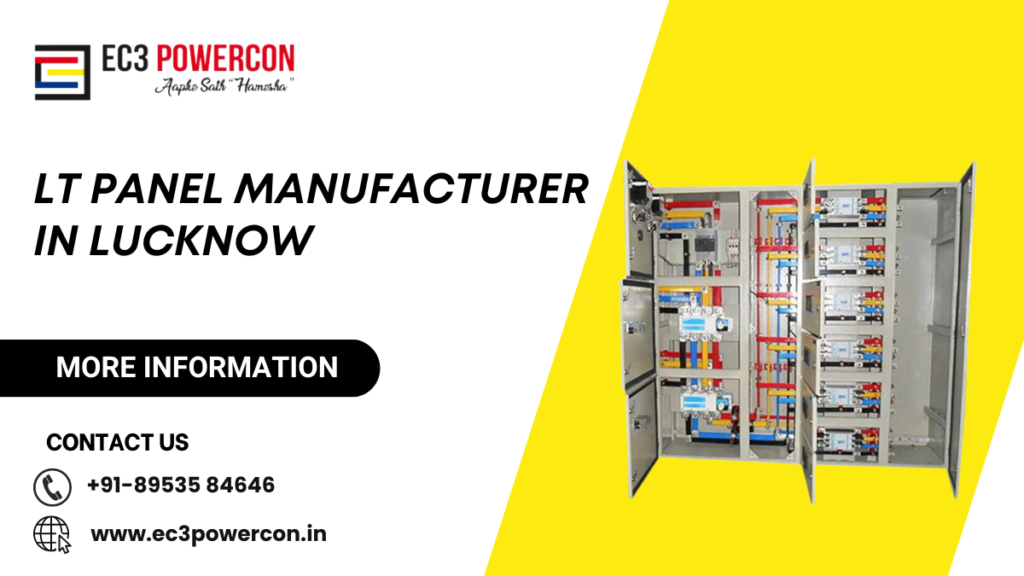The EC3 Powercon electrical control panel is a robust enclosure designed to house a combination of electrical devices for controlling and monitoring the mechanical functions of equipment and machinery. It serves various industries, commercial establishments, and residential installations. Equipped with diverse components, the EC3 Powercon panel executes programmed functions such as turning equipment on or off, regulating motor speed, operating valves for opening and closing, and facilitating a range of other movements and operations.
Table of Contents
Mainly Two types of electrical control panels are used:
- Power control centres ( PCC)
- Motor Control centres (MCC)
- Automation Panel (SCADA / PLC PANELS)
Power Control Centers (PCC Panels)
EC3 Powercon’s Power Control Centres (PCCs) play a crucial role in distributing electricity from the source to where it’s needed. These PCCs are typically located close to the power source, especially in areas with high fault levels of 50KA or 65KA for 1 second. Inside, you’ll find metallic bus bars that connect the incoming power to outgoing feeders, ensuring a smooth flow of electricity.
Moreover, EC3 Powercon’s PCCs are designed with user convenience in mind. They offer plenty of space for cable terminations, making it easy to handle the system without hassle. Additionally, these PCCs come equipped with various protection and safety devices. These devices help safeguard the system against short circuits, overloads, earth faults, and fluctuations in voltage, ensuring reliable and secure power distribution.
Benefits Of PCC Panels
- Centralized Power Distribution: PCC Panels centralize the distribution of electricity from the power source to various loads, ensuring efficient and organized power supply throughout the facility.
- High Fault Level Handling: PCC Panels are designed to handle high fault levels, often up to 50KA or 65KA for 1 second, making them suitable for use in areas with demanding electrical conditions.
- Interconnected Bus Bars: These panels feature metallic bus bars that interlink incoming power with outgoing feeders, facilitating seamless transmission of electricity and minimizing energy losses.
- Ample Cable Termination Space: PCC Panels provide ample space for cable terminations, allowing for easy installation and maintenance of electrical connections, thus reducing downtime and enhancing operational efficiency.
- Integrated Protection Devices: PCC Panels are equipped with a variety of protection devices such as circuit breakers, relays, and fuses to safeguard against short circuits, overloads, earth faults, and voltage fluctuations, ensuring the safety of the electrical system and equipment.
- Modular Design for Flexibility: Many PCC Panels feature a modular design, allowing for easy expansion or modification to accommodate changing load requirements or facility expansions, providing flexibility and scalability.
- Remote Monitoring and Control: Advanced PCC Panels may offer remote monitoring and control capabilities, enabling operators to monitor the status of the electrical system, diagnose faults, and even control power distribution remotely, enhancing operational efficiency and responsiveness.
- Compliance with Standards: PCC Panels are designed and manufactured to comply with relevant industry standards and regulations, ensuring reliability, safety, and compatibility with other electrical equipment and systems.
- Enhanced Safety Features: PCC Panels incorporate various safety features such as interlocks, emergency stop buttons, and ground fault protection to minimize the risk of electrical hazards and ensure the safety of personnel and equipment.
- Energy Efficiency: By providing efficient power distribution and incorporating features such as power factor correction and energy monitoring, PCC Panels help optimize energy usage, reduce wastage, and lower overall operating costs.
Motor Control centres (MCC)
EC3 Powercon’s MCC Panels serve as central control hubs for motors in large industrial and commercial settings. These panels consist of multiple enclosed sections, each equipped with common busbars and essential components such as power contactors, protective relays, isolators, and various control devices. Additionally, EC3 Powercon’s MCC Panels can be customized with features like Variable Frequency Drives (VFDs), Programmable Logic Controllers (PLCs), and metering equipment to suit specific requirements. Ensuring operational safety, the panels are also outfitted with protection devices including motor protection preventers, earth fault relays, and phase reversal relays.
Benefits Of PCC Panels:
Motor Control Centers (MCCs) offer several benefits for industrial and commercial applications:
- Centralized Control: MCCs provide centralized control for multiple motors from a single location, facilitating efficient monitoring and management of equipment.
- Space Efficiency: By housing motor control components in a compact and organized manner, MCCs optimize space utilization within industrial and commercial facilities.
- Ease of Installation and Maintenance: Modular construction of MCCs allows for easy installation, expansion, and maintenance, reducing downtime and operational disruptions.
- Flexibility and Scalability: MCCs can be customized to accommodate varying motor capacities and application requirements, providing flexibility and scalability as operations evolve.
- Improved Safety: Integration of safety features such as overload protection, earth fault detection, and phase reversal relays enhances operational safety and minimizes risks of equipment damage and personnel injury.
- Enhanced Efficiency: Advanced features like Variable Frequency Drives (VFDs) and Programmable Logic Controllers (PLCs) enable precise motor control, optimizing energy efficiency and reducing operational costs.
- Remote Monitoring and Control: Some MCCs offer remote monitoring and control capabilities, allowing operators to oversee motor performance and make adjustments from a distance, improving operational efficiency and responsiveness.
- Compliance with Standards: MCCs are designed and manufactured to meet industry standards and regulations, ensuring compliance with safety and performance requirements.
- Integration with Automation Systems: MCCs can seamlessly integrate with automation systems, enabling sophisticated control strategies and facilitating the implementation of Industry 4.0 initiatives.
- Cost Savings: Through efficient motor control, reduced downtime, and optimized energy consumption, MCCs contribute to cost savings over the long term, enhancing overall operational efficiency and profitability.
Automation Panels (SCADA / PLC PANEL)
PLC Automation Control Panels play a crucial role in modern electrical distribution systems. They effectively manage electricity from its source to utility centers, adapting to changing load demands. These panels automate operations in manufacturing assembly lines, ensuring smooth and efficient processes. Whether it’s adjusting to periodic or intermittent loads or orchestrating sequential operations, PLC Automation Panels streamline operations, making them essential in today’s industrial landscape.
Benefits Of Automation Panels (SCADA / PLC PANEL):
The advantages of Automation Panels, including SCADA (Supervisory Control and Data Acquisition) and PLC (Programmable Logic Controller) panels, are significant in industrial automation settings:
- Enhanced Efficiency: Automation panels streamline operations by automating processes, reducing manual intervention, and optimizing resource utilization. This leads to increased productivity and efficiency in industrial processes.
- Real-Time Monitoring and Control: SCADA and PLC panels provide real-time monitoring and control of industrial processes, allowing operators to oversee operations remotely and make quick decisions based on up-to-date data. This improves responsiveness and enables timely interventions to prevent issues or optimize performance.
- Flexibility and Customization: Automation panels offer flexibility and customization options to tailor control strategies and user interfaces according to specific process requirements. This adaptability ensures compatibility with diverse applications and allows for easy modifications as operational needs evolve.
- Data Acquisition and Analysis: SCADA panels enable comprehensive data acquisition from various sensors and devices throughout the industrial system. This data can be analyzed to identify trends, patterns, and anomalies, facilitating informed decision-making, predictive maintenance, and process optimization.
- Fault Detection and Diagnostics: Automation panels include advanced diagnostic features that detect faults, abnormalities, or deviations from predefined parameters in industrial processes. This enables proactive maintenance, troubleshooting, and resolution of issues to minimize downtime and enhance system reliability.
- Integration with Enterprise Systems: SCADA and PLC panels seamlessly integrate with enterprise systems such as MES (Manufacturing Execution Systems) and ERP (Enterprise Resource Planning) software, enabling data exchange and synchronization across the organization. This integration improves visibility, coordination, and decision-making at both operational and managerial levels.
- Energy Efficiency: Automation panels support energy management strategies by optimizing the usage of resources such as electricity, water, and fuel. They can control equipment based on demand, schedule operations during off-peak hours, and implement energy-saving algorithms to reduce consumption and costs.
- Improved Safety: Automation panels enhance safety in industrial environments by implementing safety interlocks, alarms, and emergency shutdown procedures. They can monitor critical parameters, detect hazardous conditions, and initiate appropriate responses to mitigate risks and ensure personnel and equipment safety.
Conclusion:
EC3 Powercon’s electrical control panels, including Power Control Centers (PCC Panels), Motor Control Center Panels (MCC Panels), and Automation Panels (SCADA / PLC Panels), offer a comprehensive solution for controlling and monitoring electrical systems in various industries. These panels provide centralized control, efficient power distribution, enhanced safety features, and advanced automation capabilities, contributing to increased productivity, reliability, and efficiency in industrial operations. With their modular design, flexibility, and integration with advanced technologies, EC3 Powercon’s electrical control panels are essential components for modern industrial automation applications.
Must Read: What is MCC Panel ?




Pingback: Build APFC Panel with EC3 Powercon Products